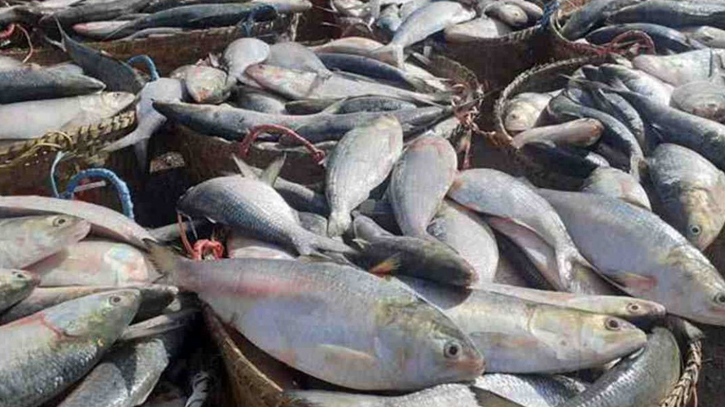
Photo : Collected
Prices of hilsa have shot up again in Chandpur markets as a 22-day ban on hilsa fishing is set to begin at midnight on Saturday, to ensure safe spawning in the freshwaters of the Padma and Meghna rivers.
The ban has sparked a rush at Chandpur’s Boro Station fish ghat, one of the country’s largest fish landing centers, where buyers have been scrambling to purchase the priced fish before the restriction takes effect.
The government ban, aimed at protecting hilsa during its spawning season, will remain in place until November 3.
Traders said hilsa weighing 1 to 1.2 kilograms is being sold for Tk2,800- 3,000 per kilogram, an all-time high. The price of smaller hilsa, weighing 500 to 900 grams, ranges from Tk 1,200 - 2,000 per kilogram.
“Prices were lower just a week ago. Now, even though I want to buy, I can’t because the prices have gone up by Tk500 - 700 per kilogram, said Solaiman, a buyer from Ashikati area.
At the fish landing centre, local fishermen were seen bringing in fresh hilsa, some from nearby areas, while others arrive by truck from Noakhali.
Omar Faruq, manager of the Kalu Bhuiyan fish shop, said “The upcoming 22-day ban is the reason. The number of retail buyers far outnumbers the fish supply here.”
With the ban approaching, some tourists have also flocked to the landing centre, turning their fish-buying trip into a family outing, Faruq adding the market has been busy from morning till night, and on Fridays, many tourists were spotted buying hilsa and having it fried at nearby restaurants.
Veteran fish traders like Nurul Islam and Mostafa Khan said they haven’t seen prices this high in over 50 years. In the city’s busiest markets, including Biponibagh and Palbazar, the story is the same.
Chandpur District Fisheries Officer Golam Mehedi Hasan explained the practice of imposing the ban. "Hilsa migrate from the sea to freshwater during this time to spawn. The 22-day ban covers a 70-kilometer stretch from Shatnol in Matlab Uttar Upazila to Char Bhairabi in Haimchar Upazila."
All fishing, transporting, selling, and stocking of hilsa in this area will be prohibited durning the ban.
Despite increased production—reaching 571,342 tonnes in the fiscal year 2022-23, up from 566,593 tonnes the previous year—the demand for hilsa remains high in Bangladesh, keeping prices elevated in the local market.
In the fiscal year 2023-24, Bangladesh exported 664.86 tonnes of hilsa to India, generating $7.71 million, according to the Department of Fisheries. The previous year saw exports of 1,376.42 tonnes of hilsa, worth $13.68 million.
Messenger/Disha








